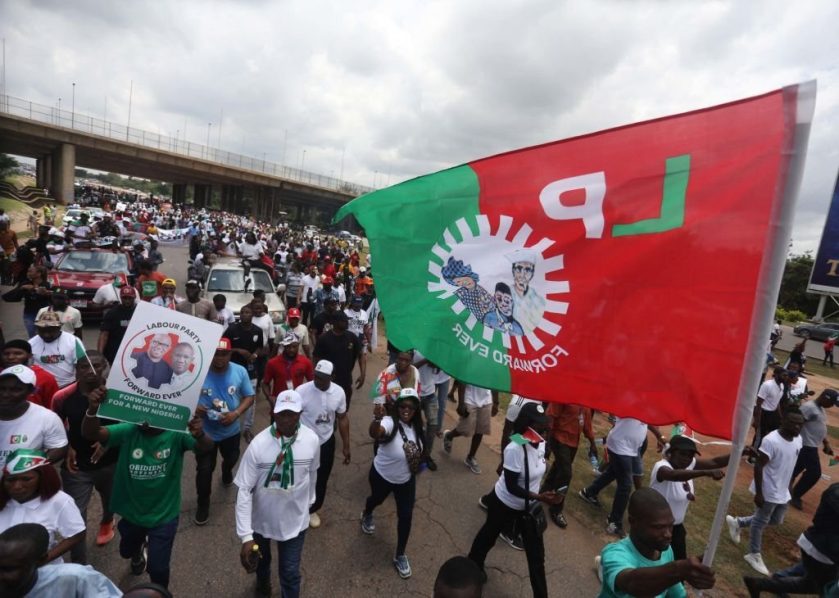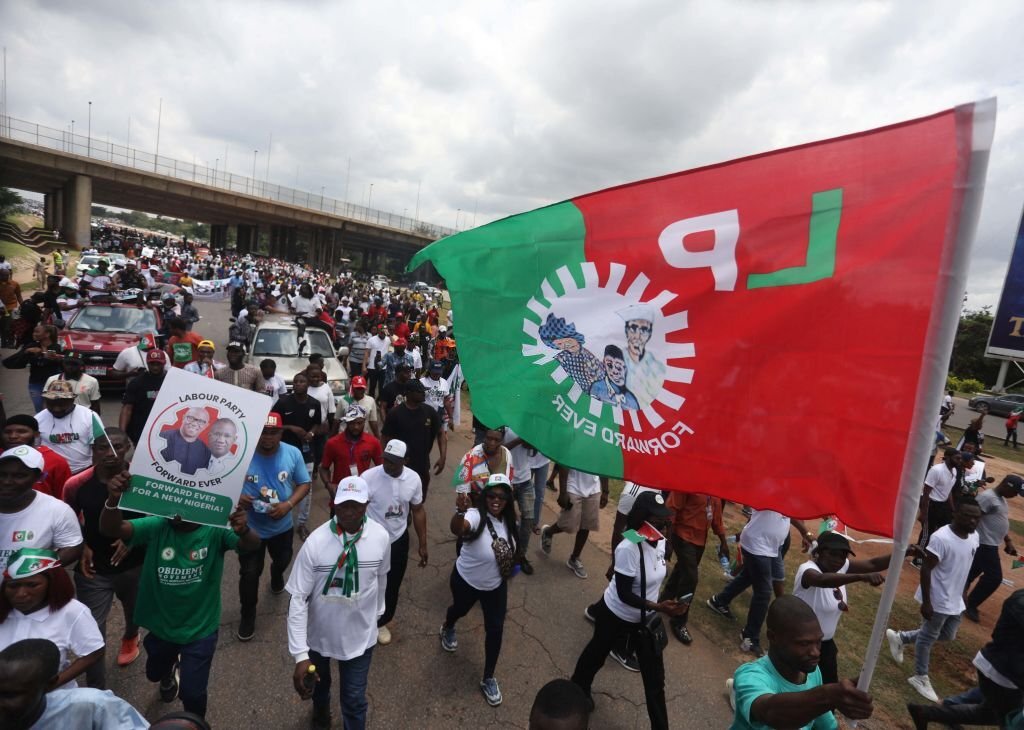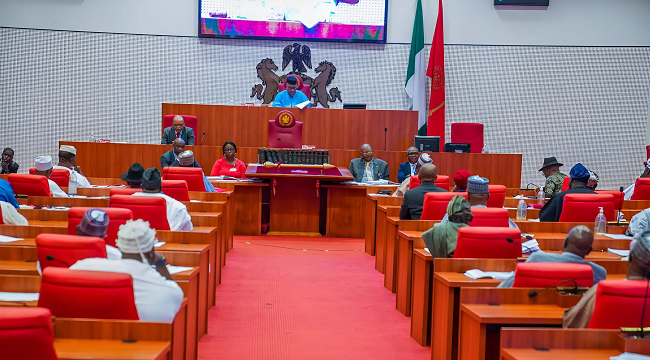
The Labour Party (LP) faced another setback yesterday, compounding its defeat in the 2023 presidential election and internal wrangling.
This was as four party members in the House of Representatives announced their defection to the ruling All Progressives Congress (APC).
The defectors are Chinedu Okere (Owerri Municipal/ Owerri North/Owerri West Constituency), Mathew Donatus (Kaura Federal Constituency, Kaduna), Akiba Bassey (Calabar Municipal/ Odukpani Constituency) and Esosa Iyawe (Oredo Federal Constituency, Edo State).
Outside the House, the Labour Party’s Diaspora Chairman, Chike Amadichi, also resigned, citing personal reasons. Amadichi disclosed his intention to join the ruling APC.
In a related development, Erhriatake Ibori-Suenu, who represents Ethiope Federal Constituency in Delta State, resigned from the Peoples Democratic Party (PDP) and defected to the APC. Ibori-Suenu is the daughter of former Delta State Governor and PDP leader, Chief James Onanefe Ibori.
Speaker of the House, Abbas Tajudeen, announced the defections during yesterday’s plenary session.
However, the Labour Party condemned the defection, describing it as a betrayal of party values and the electorate’s trust.
In a statement issued by the party’s National Publicity Secretary, Obiora Ifoh, LP criticised the defections as unconstitutional, citing Section 68(g) of the 1999 Constitution, which requires lawmakers who defect without just cause, such as a division within their party, to vacate their seats.
“The Labour Party is at peace. There is no constitutional protection for these lawmakers to abandon the party along with its mandate,” the statement read. It stressed that the party is not facing any internal crisis that could justify the defections, noting that previous issues were resolved through internal and legal mechanisms.
The party also highlighted its achievements in the 2023 general elections, securing a governorship seat, eight Senate seats, and 35 House of Representatives seats. It attributed these successes to its grassroots approach and commitment to democratic ideals, accusing the defectors of abandoning the grassroots movement that brought them to power.
The Labour Party reserved special criticism for Donatus Mathew, a former commercial motorcyclist (okada rider) from Kaduna, who cited being the only Labour Party member in the Northwest as his reason for defecting.
The party described his actions as a betrayal of the late Victoria Chintex, a Labour Party Women Leader in Kaduna who was assassinated while working to secure Mathew’s victory.
“Mathew has dishonoured Chintex’s memory and the thousands who sacrificed for his success,” the statement declared.
The Labour Party announced its intention to take legal action to reclaim the seats of the defecting lawmakers and said it would petition the Speaker of the House of Representatives to declare their seats vacant in line with the law.
It also called on Nigerians to hold the defectors accountable and reject them in future elections.
“These politicians lack democratic integrity and have shown a dangerous tendency to prioritise personal gain over public service. It is essential to isolate them and end their mercenary political careers,” the statement urged.
In his defection letter read by the Speaker, Mathew Donatus explained that his political ideals were better aligned with those of the APC.
“This decision was not taken lightly; it followed deep personal reflection. I remain committed to working tirelessly to support the goals and objectives of the APC, and I am eager to contribute to its success,” he wrote.
Bassey cited two primary reasons for his decision to leave the Labour Party. He pointed to the severe and protracted crisis within the party, characterised by two rival factions at the national level vying for leadership.
According to him, the division has extended to state and local council levels, resulting in parallel executive committees engaged in litigation.
“This crisis has made the party ineffective in fostering unity or providing a stable platform for governance. It has also created a toxic atmosphere where attending meetings called by one faction is perceived as disloyalty by the other, limiting my ability to effectively represent my constituency under the Labour Party,” he explained.
He also highlighted the leadership qualities of Cross River State Governor Bassey Otu, describing the governor’s performance as outstanding and noting the need for synergy.
“Moreover, the majority of my supporters from the 2023 elections, many of whom were formerly with the LP, SDP, or PDP, have since moved to the APC. Joining the APC will enable me to remain in sync with my supporters and contribute more effectively to the progress and development of my federal constituency, state, and the nation at large,” he added.
Iyawe, another defector, cited the Labour Party’s inability to resolve the question of “who should emerge as the legitimate caretaker committee from the national to state levels” as a key reason for his departure.
Referring to the ongoing leadership tussles and perpetual court cases plaguing the party, Esosa noted that the instability had left him and his supporters confused.
“Exercising my right to freedom of association as enshrined in the 1999 Constitution of the Federal Republic of Nigeria (as amended), I hereby notify you of my defection from the Labour Party to the APC, whose ideals align with my political aspirations and ideology,” he stated.
On her part, Ibori-Suenu attributed her resignation from the PDP to her exclusion from the activities of the state chapter of the party and the persistent national leadership crisis, which she said had divided the party into opposing factions.
However, the Minority Whip, Ali Isa (PDP, Gombe), citing a constitutional point of order, reminded the Speaker of the need to declare the seats of defectors vacant.
“I believe we, as members, must take constitutional issues seriously,” he said. “I know the Speaker respects the law, and I am confident that, in due course, he will declare some seats vacant because the constitution clearly states that if a member is sponsored by a political party to the House of Representatives or the Senate and decides to move to another party, the House shall declare the seat vacant.”
Expressing his dismay, Isa continued: “I sympathise with those who feel the need to defect to the APC. Given the hardship the APC has brought upon this country, I find it troubling that any member would consider joining the same party.”
Deputy Minority Whip George Ibezimako Ozodinobi (LP, Anambra) also criticised the defectors, describing them as individuals lacking ideology. He emphasised that the Labour Party was united and free from crises.
“My party remains one. We do not have any crisis in the Labour Party,” he said. “For those who claim there is a faction in our party, I want to make it clear that such claims are baseless. When individuals join political parties without a clear ideology, defections like these are inevitable.”
Ozodinobi continued, “People without ideology cannot be trusted, whether in APC or PDP. Let me say this: the rotten carrot dangled before those defecting to the party that has brought hunger to this country will leave them disappointed. By 2027, as the party of the people, we will welcome them back, but they will have to earn their rightful place.”
He concluded, “Those who have defected will regret their decision because they have no future in their new party.”
In response, the Speaker acknowledged the comments, saying, “We have heard your submissions, along with those of the Minority Leader. Let us wait and see what happens. Thank you for your contributions.”
Amadichi announced his resignation a few hours after the Labour Party lawmakers defected to the APC.
Speaking in Abuja after submitting his resignation letter, he explained that his decision followed extensive consultations to improve the country’s leadership and political landscape.
In his resignation letter addressed to Labour Party National Chairman Julius Abure, Amadichi expressed gratitude for the opportunity to serve millions of Labour Party supporters abroad. He confirmed that he would join the APC with over six serving Labour Party members of the House of Representatives.
“I am joining the ruling party to contribute to national development under the leadership of His Excellency Bola Ahmed Tinubu, President of the Federal Republic of Nigeria,” he said.
Amadichi also pledged to encourage his foreign partners to invest in Nigeria, supporting economic growth and development.
Meanwhile, the African Democratic Congress (ADC) yesterday expressed concerns that Nigeria’s democracy is threatened due to the weakened state of opposition political parties.
The party warned that this development has left citizens vulnerable amid harsh economic and security challenges.
Speaking at the launch of the Digital Political Academy in Abuja, ADC National Chairman, Ralphs Okey Nwosu, cited the opposition’s failure to win the Edo and Ondo governorship elections, as well as alleged human rights abuses, as indicators of the decline.
“Institutions are being desecrated, and citizens’ rights are being trampled upon. For the many families who cannot feed and for our unemployed graduates, the opposition must stand up to be counted,” Nwosu said.
The ADC leader emphasised the party’s commitment to fostering a strong opposition and promoting justice. He disclosed that the newly launched Digital Political Academy aims to empower citizens with knowledge and critical thinking skills to drive positive societal change.
This came as former Governor of Ekiti State, Kayode Fayemi, and a former Nigerian Ambassador to the Philippines, Dr Yemi Farounbi, criticised the nation’s “winner-takes-all” electoral system, calling for reforms to ensure inclusivity and stability.
The call was made during a lecture titled “The Future and Challenges of the Nigerian Nation” in honour of Dr Farounbi’s 80th birthday, held in Ibadan.
Fayemi highlighted the flaws in Nigeria’s electoral process, describing it as a “recipe for instability.” He advocated proportional representation to replace the current majoritarian system. According to him, this approach would enable governance by consensus, where all political stakeholders play crucial roles.
He explained, “Proportional representation ensures the election winner leads the government but also includes others based on their performance in national elections. This synthesis of manifestos would promote national integration and stability.”
On fiscal federalism, Fayemi emphasised the need for restructuring that prioritises governance efficiency over geographical adjustments. He stressed devolving powers and resources to federating units, blaming the over-centralisation of authority on prolonged military rule and the 1999 Constitution, which he said lacked inclusivity.
“The focus should be on transferring certain responsibilities from the exclusive to the concurrent legislative list, addressing issues like revenue allocation, land tenure, and local government autonomy,” he noted.
Farounbi echoed these sentiments, expressing optimism about Nigeria’s future. “Nigeria has a future. We will get there,” he said, urging unity and collective effort.






